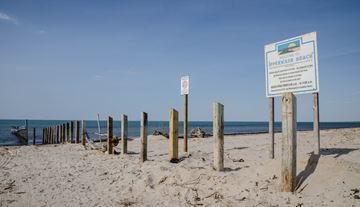Kettle Stony Point step away from table

Kettle and Stony Point First Nations (KSPFN) have decided to step back from the working group process that had established an interim arrangement to the matter of vehicles driving on Ipperwash Beach between West Ipperwash Road and Army Camp Road.
”I appreciate the efforts of those parties who supported the process and the First Nation will assess its options for moving forward. Continued dialogue in building on and strengthening the working relationship with Lambton Shores remains a primary focus,” said Chief Bressette regarding Tuesday’s meeting that he did not attend.
The Provincial Government, through the Ministry of Aboriginal Affairs, took a lead in drawing the affected stakeholders together. The “stakeholders” have become known as the “Ipperwash Beach Management Group” and include: The Province (represented by both the Ministry of Aboriginal Affairs and the Ministry of Natural Resources and Forestry); The Chippewas of Kettle and Stony Point First Nation; The Municipality of Lambton Shores; The Centre Ipperwash Community Association; The West Ipperwash Property Owners Association; and the St. Clair Region Conservation Authority. Lambton Shores is represented by Mayor Weber, Councillor Rupke and CAO Kevin Williams.
This forum, agreed to keep vehicles off the beach this summer. Eugene Dorey, Centre Ipperwash Community Association chair told Postmedia Network to their knowledge, “The agreement in place for 2015, namely no vehicular traffic, is still in place. As to why he felt KSPFN left the table, Dorey cited that Bressette felt there “was a lack of appreciation and respect by the group.”
Since the early 1970’s motorized vehicle use by the general public has been limited on the section of Ipperwash Beach between Army Camp Road and West Ipperwash Road. This limitation was put in place by the then Department of Lands and Forests with the agreement of Bosanquet Township, reportedly to deal with both environmental and public safety concerns at the time.
Claiming the right to do so, in December 2014 the Kettle and Stony Point First Nation removed barriers adjacent to the West Ipperwash, Ipperwash, and Army Camp Road allowances. In a statement issued at the time the barriers came down, Bressette stated the band had opted to assert its jurisdiction over what it referred to as historic trails. Without the barriers in place, vehicles were no longer physically prevented from accessing the beach between the road allowances. Cottage owners along that stretch have deeds that state their properties extend to the water’s edge. They argue that cars are a detriment to safe use of the beach, there are environmental concerns, property values are being affected and they cite potential liability issues if someone were to get hurt.
When the barriers came down last winter, it triggered concern from the municipality and the area residents, and precipitated the immediate involvement of the Ontario Provincial Police, the Ontario Ministry of Natural Resources and the Ontario Ministry of Aboriginal Affairs. Since that time the council, working with Kettle Point has been trying to find a respectful and lawful solution to the disputed matter of vehicle access to the Ipperwash beaches between West Ipperwash Road andArmy Camp Road. The mayor and CAO continue to press for a meaningful and timely response from both the Provincial and the Federal government as necessary, speaking to the claim of jurisdiction being made by Bressette.
Having said that, the municipality asserts its own right and obligation to regulate activities within its road allowance including those affecting vehicle flow, and parking.
“That notwithstanding the rights and obligations of affected property owners to represent their own concerns, the Municipality will reflect citizen feedback, specifically including any concerns related to conflict of use that could affect public safety and negative environmental impact,” explains a report from CAO Kevin Williams to council in early May.
Outside of the working group, Chief Bressette and Mayor Weber have both met with the OPP to advise of this decision. Accordingly, the OPP will be responding to policing needs on the beach in the same manner as past years.
In May the working group agreed upon a shared control sign to indicate restricted motorized vehicle uses on Centre Ipperwash Beach. The group installed a “bollard style” fence to mark the edge of the road allowances and provide a physical restriction to motorized vehicles. The bollards will remain open in between to encourage easy pedestrian access. The steel guardrails that previously acted as a more formidable barrier to access will not be installed. A larger gap between posts has been established to provide access for emergency vehicles. The intention is to close this gap with a draped rope for easy access if needed. None of these actions has an impact on the public’s use of the Ipperwash or Army Camp Road allowances for waterfront access.
The beach management agreement between the First Nation and the West Ipperwash Property Owners Association will be renewed for 2015. The agreement permits controlled vehicle access to that particular section of beach with a fee/permit structure in place. This agreement also has no impact on the West Ipperwash municipal road allowance which remains open for public access. In effect, all beach uses in 2015 will remain unchanged from 2014.
“The Ministry of Natural Resources has been instrumental in sharing information with the working group. They have advised that despite the fact that both the province and the Centre Ipperwash property owners have deeds indicating ownership “to the water’s edge”, there is a “Crown Reservation” across the beach portion of each property. The original Canada Company patent established this reservation to ensure beach access remained open to all members of the public, ” said Williams explaining the Centre Ipperwash Community Association has for many years had a “Welcome, and rules” sign at each road allowance inviting the public to use the beach portion of their property, and advising of restrictions and use at an individual’s own risk.
The Working Group process, which was scheduled to end in May, will come to a close on June 9, with a final meeting. “While it was a difficult process, it brought all parties together to share perspectives and history on the beach. Ultimately the working group was able to settle on shared values that include public safety, environmental protection, historic uses, and protection of property” and this will form a basis for future discussions,” said Weber adding, “I appreciate the on-going dialogue that has brought us this far and I am proud of what the table has been able to accomplish in terms of this arrangement. The posts and signs to restrict vehicle use were installed prior to the May long weekend and have been well received”.
KSPFN and the Municipality of Lambton Shores will continue to work together on many shared community interests, especially in the areas of infrastructure and economic development.
Weber and Bressette are both candid in recognizing that reaching a long term agreement on uses affecting Ipperwash Beach will not be quick or easy, both say they have committed to an ongoing dialogue on issues and opportunities of importance to both their communities.
Source: Lakeshore Advance | Kettle Stony Point step away from table
